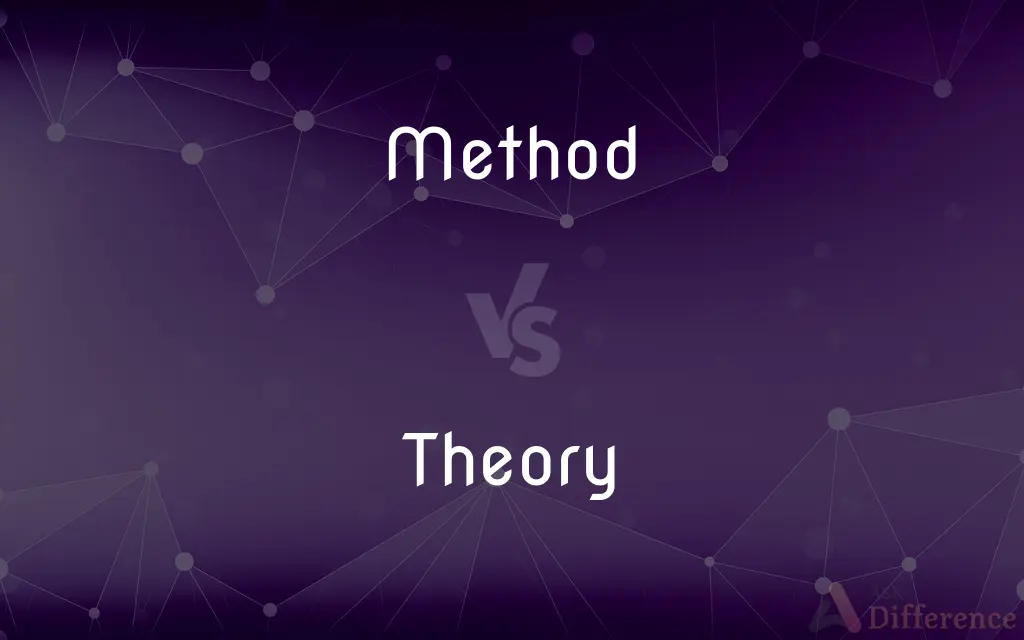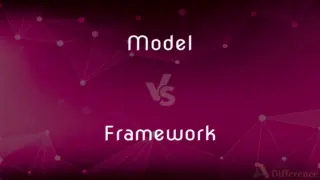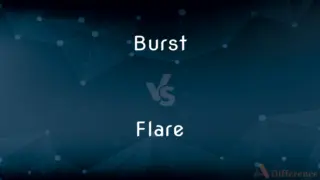Method vs. Theory — What's the Difference?
Edited by Tayyaba Rehman — By Fiza Rafique — Updated on March 10, 2024
A method is a procedure for achieving something, while a theory is an explanation of phenomena.

Difference Between Method and Theory
Table of Contents
ADVERTISEMENT
Key Differences
A method refers to a systematic procedure or set of rules used to accomplish a particular task or to solve a problem. It is a practical, step-by-step approach that guides actions within a specific domain, like scientific research, teaching, or software development. On the other hand, a theory is an established set of principles or explanations that has been repeatedly tested and validated, serving to explain certain facts or phenomena. Theories are developed through observation, experimentation, and analysis, aiming to provide a coherent understanding of how something works or why something happens.
While methods are about the 'how'—the procedure or technique for doing something—theories focus on the 'why'—the underlying principles that explain phenomena or behaviors. A method might be used to test or explore a theory, but a theory provides the framework or context for understanding the results of those methods.
Methods are often more practical and focused on application, providing a roadmap or guideline for achieving specific goals or tasks. In contrast, theories are more conceptual, offering explanations that help understand and predict patterns or behaviors within a particular field.
In summary, a method is a systematic way of doing something, characterized by its procedural and practical nature, while a theory is a conceptual framework that explains phenomena, based on principles that have been validated through testing and observation.
Comparison Chart
Definition
A systematic procedure for accomplishing a task or solving a problem.
An explanation of phenomena, grounded in observations and testing.
ADVERTISEMENT
Purpose
To provide a structured approach for achieving specific goals.
To explain and predict phenomena based on established principles.
Nature
Practical and procedural.
Conceptual and explanatory.
Focus
On the 'how' - the techniques or processes involved.
On the 'why' - the underlying principles or reasons.
Application
Used to implement, test, or explore within a specific domain.
Provides a framework for understanding and interpreting results.
Compare with Definitions
Method
A systematic way of doing something.
The Montessori method focuses on child-led learning.
Theory
A set of principles on which the practice of an activity is based.
Einstein's theory of relativity revolutionized physics.
Method
A procedure or set of rules followed in a particular field.
Agile is a popular method in software development for managing projects.
Theory
A hypothesis or set of hypotheses that have been substantiated by observation or experiment.
The germ theory of disease explains how illnesses are caused by microorganisms.
Method
A way of approaching a problem or task.
Her method for organizing the event was highly effective.
Theory
A set of abstract principles related to a specific field of study.
Music theory involves understanding the structure and composition of music.
Method
A technique or tool used in a specific area of study or activity.
Meditation is a method for reducing stress and improving concentration.
Theory
An idea used to account for a situation or justify a course of action.
His theory was that taking small, incremental steps would lead to success.
Method
A manner or mode of expression in art or science.
The artist's method involves layering paint to create texture.
Theory
An explanation or system of ideas intended to explain something.
Darwin's theory of evolution provides a framework for understanding biodiversity.
Method
A means or manner of procedure, especially a regular and systematic way of accomplishing something
A simple method for making a pie crust.
Mediation as a method of solving disputes. See Usage Note at methodology.
Theory
A theory is a rational type of abstract thinking about a phenomenon, or the results of such thinking. The process of contemplative and rational thinking is often associated with such processes as observational study or research.
Method
Orderly arrangement of parts or steps to accomplish an end
Random efforts that lack method.
Theory
A set of statements or principles devised to explain a group of facts or phenomena, especially one that has been repeatedly tested or is widely accepted and can be used to make predictions about natural phenomena.
Method
The procedures and techniques characteristic of a particular discipline or field of knowledge
This field course gives an overview of archaeological method.
Theory
The branch of a science or art consisting of its explanatory statements, accepted principles, and methods of analysis, as opposed to practice
A fine musician who had never studied theory.
Method
Method A technique of acting in which the actor recalls emotions and reactions from past experience and uses them in identifying with and individualizing the character being portrayed.
Theory
A set of theorems that constitute a systematic view of a branch of mathematics.
Method
A process by which a task is completed; a way of doing something (followed by the adposition of, to or for before the purpose of the process).
If one method doesn't work, you should ask a friend to help you.
Theory
Abstract reasoning; speculation
A decision based on experience rather than theory.
Method
A technique for acting based on the ideas articulated by Konstantin Stanislavski and focusing on authentically experiencing the inner life of the character being portrayed.
Theory
A belief or principle that guides action or assists comprehension or judgment
Staked out the house on the theory that criminals usually return to the scene of the crime.
Method
(object-oriented) A subroutine or function belonging to a class or object.
Theory
An assumption based on limited information or knowledge; a conjecture.
Method
(slang) Marijuana.
Theory
A description of an event or system that is considered to be accurate.
Method
(dated) An instruction book systematically arranged.
Theory
(sciences) A coherent statement or set of ideas that explains observed facts or phenomena and correctly predicts new facts or phenomena not previously observed, or which sets out the laws and principles of something known or observed; a hypothesis confirmed by observation, experiment etc.
Method
Ellipsis of method air.
Theory
(uncountable) The underlying principles or methods of a given technical skill, art etc., as opposed to its practice.
Method
(transitive) To apply a method to.
Theory
(mathematics) A field of study attempting to exhaustively describe a particular class of constructs.
Knot theory classifies the mappings of a circle into 3-space.
Method
To apply particular treatment methods to (a mold).
The company employs extensive use of 3D modelling combined with solidification simulation to ensure that critical castings are properly methoded.
Theory
A hypothesis or conjecture.
Method
An orderly procedure or process; regular manner of doing anything; hence, manner; way; mode; as, a method of teaching languages; a method of improving the mind.
Theory
A set of axioms together with all statements derivable from them; or, a set of statements which are deductively closed. Equivalently, a formal language plus a set of axioms (from which can then be derived theorems). The statements may be required to all be bound (i.e., to have no free variables).
A theory is consistent if it has a model.
Method
Orderly arrangement, elucidation, development, or classification; clear and lucid exhibition; systematic arrangement peculiar to an individual.
Though this be madness, yet there's method in it.
All method is a rational progress, a progress toward an end.
Theory
A doctrine, or scheme of things, which terminates in speculation or contemplation, without a view to practice; hypothesis; speculation.
Method
Classification; a mode or system of classifying natural objects according to certain common characteristics; as, the method of Theophrastus; the method of Ray; the Linnæan method.
Theory
An exposition of the general or abstract principles of any science; as, the theory of music.
Method
A technique used in acting in which the actor tries to identify with the individual personality of the specific character being portrayed, so as to provide a realistic rendering of the character's role. Also called the Method, method acting, the Stanislavsky Method or Stanislavsky System.
Theory
The science, as distinguished from the art; as, the theory and practice of medicine.
Method
A way of doing something, especially a systematic way; implies an orderly logical arrangement (usually in steps)
Theory
The philosophical explanation of phenomena, either physical or moral; as, Lavoisier's theory of combustion; Adam Smith's theory of moral sentiments.
Theory
A well-substantiated explanation of some aspect of the natural world; an organized system of accepted knowledge that applies in a variety of circumstances to explain a specific set of phenomena;
Theories can incorporate facts and laws and tested hypotheses
True in fact and theory
Theory
A tentative theory about the natural world; a concept that is not yet verified but that if true would explain certain facts or phenomena;
A scientific hypothesis that survives experimental testing becomes a scientific theory
He proposed a fresh theory of alkalis that later was accepted in chemical practices
Theory
A belief that can guide behavior;
The architect has a theory that more is less
They killed him on the theory that dead men tell no tales
Common Curiosities
What is a method?
A method is a systematic procedure or set of rules used to accomplish a particular task or solve a problem.
Can a method evolve into a theory?
Generally, methods and theories remain distinct; however, the application of a method could contribute to the development or refinement of a theory.
What is a theory?
A theory is an established set of principles or explanations that has been tested and validated, serving to explain certain facts or phenomena.
How do methods and theories differ?
Methods are about the 'how'—the procedures or techniques for doing something, while theories focus on the 'why'—the underlying principles that explain phenomena or behaviors.
Is a theory always correct?
Theories are the best explanations available based on current evidence, but they can be revised or replaced as new evidence emerges.
How important are theories in daily life?
Theories inform many aspects of daily life by providing explanations for phenomena and influencing practices in fields like medicine, technology, and psychology.
Can methods be used to test theories?
Yes, methods can be employed to test or explore theories by providing a structured approach to investigation or problem-solving.
Can there be multiple theories for the same phenomenon?
Yes, particularly in complex or less understood areas, there might be multiple competing theories that seek to explain the same phenomenon.
How are methods developed?
Methods are developed through practical experience, research, and often through the testing of different approaches to find the most effective way to achieve a goal.
Do all fields of study have theories?
Most fields of study develop theories to explain core principles and phenomena, though the nature and scope of these theories can vary widely.
Do theories change over time?
Yes, theories can evolve or change as new evidence becomes available, leading to refined or entirely new theoretical frameworks.
Are theories always based on scientific evidence?
While many theories, especially in scientific disciplines, are based on empirical evidence, some theories might be more speculative or philosophical in nature.
Are all methods scientific?
Not all methods are strictly scientific; methods can also apply to non-scientific disciplines such as art, education, or business.
How do methods and theories interact?
Methods provide the means to test, apply, and sometimes challenge theories, while theories offer the conceptual foundation that guides the development and use of methods.
Can methods be applied universally?
While some methods can be broadly applicable, others are specific to certain fields or contexts and may not be universally applicable.
Share Your Discovery

Previous Comparison
Model vs. Framework
Next Comparison
Burst vs. FlareAuthor Spotlight
Written by
Fiza RafiqueFiza Rafique is a skilled content writer at AskDifference.com, where she meticulously refines and enhances written pieces. Drawing from her vast editorial expertise, Fiza ensures clarity, accuracy, and precision in every article. Passionate about language, she continually seeks to elevate the quality of content for readers worldwide.
Edited by
Tayyaba RehmanTayyaba Rehman is a distinguished writer, currently serving as a primary contributor to askdifference.com. As a researcher in semantics and etymology, Tayyaba's passion for the complexity of languages and their distinctions has found a perfect home on the platform. Tayyaba delves into the intricacies of language, distinguishing between commonly confused words and phrases, thereby providing clarity for readers worldwide.
















































